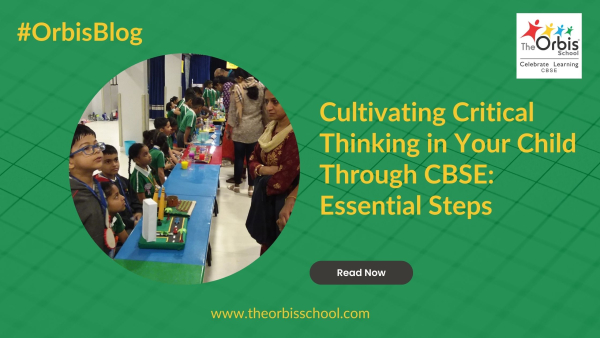Cultivating Critical Thinking in Your Child Through CBSE: Essential Steps
In today's rapidly evolving world, the ability to think critically is more important than ever. As parents, fostering this skill in our children is crucial for their academic success and future endeavours. Fortunately, the CBSE education provides a fertile ground for nurturing critical thinking skills in children. Through its holistic curriculum, emphasis on inquiry-based learning, application-oriented approach, continuous comprehensive assessment, project-based learning, and encouragement of open dialogue, CBSE equips students with the tools they need to become independent thinkers, problem solvers, and lifelong learners.
In this blog, we'll look at crucial actions parents may take to help their children develop critical thinking skills through CBSE education.
Understanding Critical Thinking: Defining the Concept for Parents
Critical thinking involves analyzing information, evaluating evidence, and making reasoned judgments. It's about asking questions, challenging assumptions, and thinking independently. As parents, understanding this concept is the first step in supporting our children's critical thinking development.
Creating an Environment Conducive to Critical Thinking Development
CBSE education encourages open dialogue and discussion in the classroom, where students are encouraged to voice their opinions, question assumptions, and engage in respectful debate. This free exchange of ideas not only broadens perspectives but also challenges students to think critically, defend their viewpoints, and consider alternative viewpoints. Likewise, create a home environment that values curiosity, inquiry, and open-mindedness. Encourage your child to ask questions, explore ideas, and express their opinions freely. Foster a culture of intellectual curiosity where learning is celebrated and mistakes are viewed as opportunities for growth.
Encouraging Curiosity and Inquiry in Daily Activities
Encourage your child to explore diverse topics and interests that pique their curiosity. Whether it's through reading books, watching educational videos, or conducting hands-on experiments, provide opportunities for your child to engage in active learning and exploration.
Teaching Problem-Solving Techniques from an Early Age
Teach your child problem-solving techniques such as breaking down complex problems into smaller parts, brainstorming solutions, and evaluating alternatives. Encourage them to approach challenges with a positive mindset and persevere in finding solutions.
Engaging in Thought-Provoking Discussions and Activities
Engage your child in thought-provoking discussions on a wide range of topics, from current events to ethical dilemmas. Encourage them to consider different perspectives, challenge assumptions, and articulate their reasoning. Provide opportunities for debate, critical analysis, reflection, and making connections between different concepts and disciplines.
Utilizing Real-World Examples to Enhance Critical Thinking Skills
Use real-world examples and scenarios to illustrate abstract concepts and enhance critical thinking skills. Discuss how critical thinking is applied in everyday situations, such as analyzing newspaper articles, advertisements, evaluating product reviews, or making financial decisions.
Providing Opportunities for Independent Exploration and Decision-Making
Empower your child to make independent decisions and take ownership of their learning journey. Encourage them to explore their interests, set goals, and pursue projects that align with their passions. Provide guidance and support, but allow them the freedom to explore and make mistakes.
By fostering a culture of curiosity, exploration, and critical inquiry, CBSE education empowers students to navigate the complexities of the world with confidence, clarity, and creativity. As a result, CBSE students emerge not only academically proficient but also intellectually curious, adaptable, and capable of making meaningful contributions to society.

